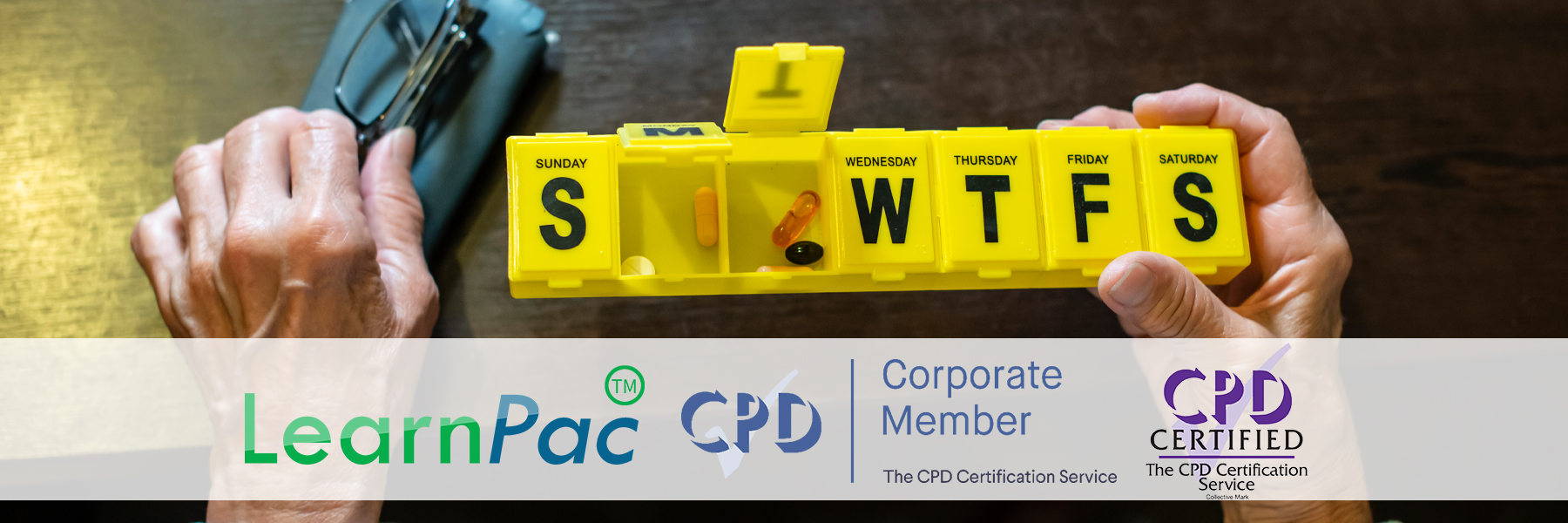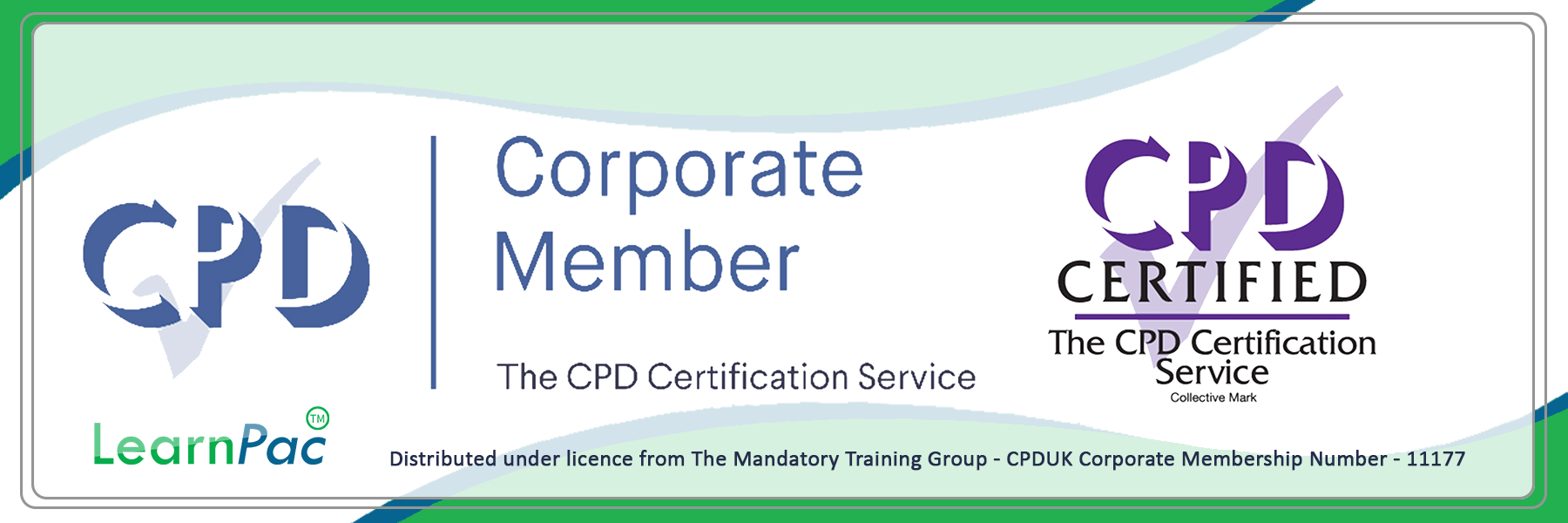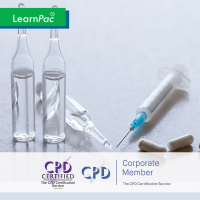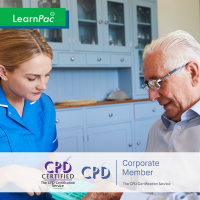Medicines Management - E-Learning Courses - CPDUK Accredited

Medicines Management – E-Learning Courses with Certificates – CPDUK Accredited.
LearnPac Systems is the leading UK provider of accredited statutory and mandatory training courses for all sectors, including health and social care, education, local government, private and charity sectors.
Medicines management is a fundamental aspect of healthcare practitioners role. This session will provide the individual with essential theoretical and practical elements to be able to prepare and administer medicines safely.
Our medicines management e-learning courses increase participants’ knowledge relating to how drugs work, potential risks and hazards associated with medicines, and provide an overview of the legal and professional aspects of medicines management.
Browse our Medicines Management - E-Learning Courses
Medicines Management: Frequently Asked Questions and Answers
Medicines Management – E-Learning Courses with Certificates – CPDUK Accredited – LearnPac Systems UK.
Here at LearnPac Systems, we receive many questions about medicines management. We have provided answers to the most frequently asked questions about medicines management.
Click on the text below to see the answers to the Frequently Asked Questions about Medicines Management.
Medicine management is a complex and multi-layered area which requires practical training to ensure safe and legal practice. This professionally-developed interactive e-learning intends to give a clear understanding of the topic and the responsibilities of your professional role.
LearnPac Systems is the leading UK provider of accredited statutory and mandatory training courses for all sectors, including health and social care, education, local government, private and charity sectors.
Click here for Medicines Management for Nurses & AHPs – Online Course – CPD Accredited
Medicines management is a fundamental aspect of healthcare practitioners role. This session will provide the individual with essential theoretical and practical elements to be able to prepare and administer medicines safely.
The course will increase participants’ knowledge relating to how drugs work, potential risks and hazards associated with medicines, and provide an overview of the legal and professional aspects of medicines management.
LearnPac Systems is the leading UK provider of accredited statutory and mandatory training courses for all sectors, including health and social care, education, local government, private and charity sectors.
Click here for Medication Management for Domiciliary Care – CPDUK Accredited
This course aims to enable the participant to gain an understanding of medicines management for the safe and effective use of medications.
LearnPac Systems is the leading UK provider of accredited statutory and mandatory training courses for all sectors, including health and social care, education, local government, private and charity sectors.
Click here for Medicines Management for Nurses & AHPs – Online Course – CPD Accredited
Medication training is essential for those working in the health and social care sector. Medication awareness training will cover the administration, prescribing, managing and handling of medicines safely such as morphine, sedatives, laxatives and antibiotics.
Medicines management is a system of processes and behaviours that determines the way that patients in the NHS use medicines. Up to 50% of patients do not take the medication they have been prescribed.
Medicines management is an evidence-based approach to prescribing, which balances the safety, tolerability, effectiveness, cost and simplicity of treatments. Right medicines management means that patients receive better, safer and more convenient care.
Medicine is the field of health and healing. It covers diagnosis, treatment, and prevention of disease, medical research, and many other aspects of health. Medicine aims to promote and maintain health and wellbeing. Conventional modern medicine is sometimes called allopathic medicine.
Prescribing medication can only be done by registered practitioners with appropriate qualification. As a health care assistant, you must not put yourself into a position where you have to make a judgement about medication. Such as whether it is appropriate to give it when a person’s condition has changed.
The most common types of medication error are as follows:
- Wrong time of administration,
- Omission and wrong dose,
- Wrong preparation,
- Wrong administration rate for intravenous medication.
Medicine optimisation is defined as a person‑centred approach to safe and effective medicines use, to ensure people obtain the best possible outcomes from their medicines. Medicine optimisation applies to people who may or may not take their medicines effectively.
It is an essential tool for ensuring the health of individuals as well as managing their health care costs. Benefits of providing medication management include better outcomes for older adults and reduced illnesses and deaths due to medication noncompliance or drug interactions.
Healthcare assistants help healthcare professionals to care for patients. However, healthcare assistants are not allowed to administer medication or perform complex nursing procedures. They are responsible for performing simple medical tasks such as taking blood and inserting needles into veins.
Training for nurses is to ensure safe medication preparation and administration. The “7 rights” of medication administration include patient, right drug, right dose, right time, right route, right reason and right documentation.
In most cases, a licensed nurse conducts the med pass. However, some states allow for an unlicensed nursing staff member to administer the medication under the general supervision of a nurse. The med pass typically requires 4 to 5 hours of the nurse’s time during medication administration.
The most common types of reported errors were wrong dosage and infusion rate. The most common causes were using abbreviations instead of full names of drugs and similar names of medicines. Therefore, the most important cause of medication errors was the lack of pharmacological knowledge.
Medication errors occur for several reasons. Often, these mistakes take place because of inefficient procedures, improper communication, and medications that sound very similar.
A medication incident is a mistake with medication or a problem that could cause an error with medication. Medication incidents include apparent things like receiving the wrong medication or dose. It might also include issues like a confusing label that might lead to someone receiving the wrong medication.
Medicines are chemicals or compounds used to cure, halt, or prevent diseases. Further, it helps to ease symptoms and in the diagnosis of illnesses. Advances in medications have enabled doctors to cure many diseases and save lives.
Medicines optimisation is an approach to the quality use of medicines that aims to produce the best possible outcomes. In contrast, medicines management differ in several ways but predominantly focused on results rather than process, patients rather than systems, and is led rather than delivered.
The Medication Management Plan (MMP) is a standardised medicine reconciliation form used at hospital admission. The basis of MMP is on the Medication Action Plan developed, in consultation with nurses, doctors and pharmacists.
Medical and health services managers, also called healthcare executives or healthcare administrators, plan, direct, and coordinate medical and health services. They might manage an entire facility or specialise in achieving a specific clinical area or department or manage a medical practice for a group of physicians.
Medicines management involves the safe and cost-effective use of medicines in clinical practice, with maximum patient benefits while minimising potential harm. Standards for Medicines Management (NMC 2007) provides nurses with a framework for safe practice in medicines management.
6 tips for the medication management process include:
- Put a pharmacist in charge
- Ensure patients have ample access to a pharmacist or pharmacy students
- Educate patients about the most common medication mistakes
- Check the Beers list
- Remove unnecessary medications when possible
- Watch for the “prescription cascade”.
The nurse is responsible for ensuring that they know the correct administration of drugs. Medication charts are legal documents and completion should be accurate and unambiguous to ensure that patients receive safe and optimal drug therapy.
Registered nurses generally should administer medications only with a physician’s order. Only sure advanced practice nurses have prescriptive authority, qualifications, as well as the type of drug and the amount they are allowed to prescribe, vary from state to state.
It is a medicinal product by a nurse or midwife in identified clinical situations. Administer medication to groups of patients/service users in a defined case meeting specific criteria and who may not be individually identified before presentation for treatment.
Midwives can prescribe medications and order tests. CNMs and CMs are licensed to prescribe a full range of substances, medications, and treatments, including pain control medications and birth control.
Polypharmacy is common in the elderly and is fraught with risks. Managing medications is a significant part of providing care to older adults. They need a careful and systematic approach for managing drug therapy in these patients, recognising the patient’s specific goals.
Safely managing medications is essential for senior health. Studies show that 87% of seniors take one prescription drug, 36% take five or more, and 38% use over-the-counter medications. Taking proper medicine is essential for treating adult’s health conditions and managing symptoms.
Medication awareness course aims to improve learners’ understanding of the necessity of accurate recording and to report when medication is administered, in the interests of patient safety and the wider NHS. .
Care assistants should only administer medicines that they trained to give and that this will generally include assisting people in taking tablets, capsules, oral mixtures.
Medicines management e-learning packages cover prescribing, dispensing, administration, safe handling, controlled drugs and rapid tranquillisation. These packages aim to improve medicines management and to enhance patient safety and care standards.
LearnPac Systems is the leading UK provider of accredited statutory and mandatory training courses for all sectors, including health and social care, education, local government, private and charity sectors.
On successful completion of each of the medicines management courses modules, you will be able to download, save and/or print a quality assured continuing professional development (CPD) certificate. Our CPD certificates are recognised internationally and can be used to provide evidence for compliance and audit.
The CPD Certification Service (CPDUK) accredits all of our statutory and mandatory training courses as conforming to universally accepted Continuous Professional Development (CPD) guidelines.
LearnPac Systems is distributed under the licence from The Mandatory Training Group – CPDUK Corporate Memebrship Number – 1117.



